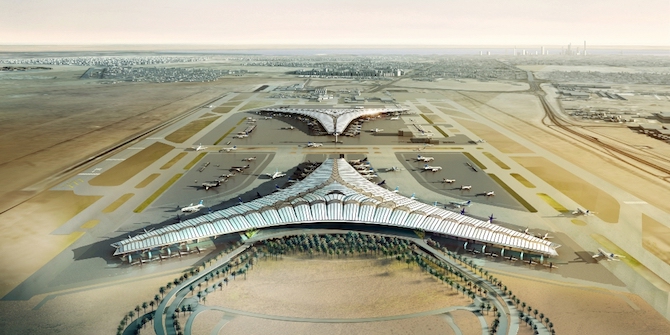by Sophie Olver-Ellis

Looking back over the last five decades, the socio-economic advancement and political legitimacy of the ruling elite in Gulf Cooperation Council (GCC) states have been fundamentally rooted in the oil-based development model. As the region’s oil wealth has historically been vast, the ruling elites adopted a social contract which offered free healthcare, education and guaranteed lifelong public sector employment to the national citizenry. Oil therefore, has been the elixir of life for many in the Arabian Gulf. Despite the exceptional wealth and welfare provisions that oil-based economies have afforded the region’s citizenry, associated social and economic structures have become extremely distorted and segmented: the public sector has come to dominate the economy, providing employment for a majority of the national citizenry, whilst the private sector has remained largely marginalised and dominated by migrant manpower. Since 2014, the Gulf has experienced such extreme oil price volatility that it has brought urgency to the longstanding known fact that the oil-based development model is not sustainable and that there is a need to diversify their economic base. Quite simply, the governments have to be seen to be doing something about their increasing budget deficits, burgeoning unemployed youth populations and economies that remain dependent on the volatile oil sector. Consequently, they are drawing up new development visions which aim to guide their socio-economic transformation over the coming decades.
This issue is particularly pertinent for Kuwait, since oil revenues account for 90% of the government’s income and comprise nearly 50% of the country’s GDP. With increasing public expenditure, whereby 16% of the government’s 2018/19 budget is reserved for subsidies and 54% for the salaries of Kuwaiti workers, the ruling elite can no longer afford the oil-funded social contract of yesteryear. Further contributing to Kuwait’s challenges is the fact that, despite hosting the sixth-largest proven oil reserves in the world, the country has socio-economically stagnated over recent decades to the point that it is now considered one of the region’s least dynamic economies. Kuwait also lags far behind the rest of the GCC in other important metrics such as economic competitiveness and regulatory environment. This is particularly the case in the design and adoption of relevant policies that assist the ease of doing business, restructuring the labour market and advancing national human capital. The lack of progress in these areas has hindered the economic diversification process, and they remain an essential area of regulation for the impending post-oil dependent era.
The presence of parliamentary politics has also contributed to the economic stalemate the country has experienced, with the cancelled multibillion-dollar deal between Dow Chemical and the state-owned Kuwaiti company Petrochemical Industries being one of the most prominent examples of a major lost opportunity within the last decade. In this case, after the 2008 global financial collapse and consequent extreme oil price volatility, some Kuwaiti lawmakers were critical of the deal and questioned its economic viability, while parliament opposed the perceived high-risk deal due to its unpredictable consequences in an already tumultuous time for the global economy. The parliament therefore requested that the Kuwaiti government’s Supreme Petroleum Council back out of the deal and take all necessary legal steps to ensure that the cancellation of the contract would not harm the reputation and interests of the state. Were he to fail to cancel the deal, numerous MPs and lawmakers claimed that they would challenge and interrogate the prime minister in parliament and potentially trigger a political crisis.
However, despite these longstanding dire economic and socio-political conditions, it is paramount for the country’s long-term survival that Kuwait move beyond its extreme oil-dependent development model. Because as noted by the government itself, the state needs to stop wasting natural resource revenues, cut frivolous public spending and fix the state budget imbalance if it is to build a prosperous and sustainable country in the twenty-first century.
In an attempt to address these challenges, in 2017 the Kuwaiti government unveiled an ambitious plan entitled ‘Vision 2035’, which seeks to transform the country into a leading regional financial, commercial and cultural hub within 17 years. The overriding objective of the Vision is to reduce the government’s role in the implementation of development projects from the current rate of 90 percent to a more sustainable rate of 30–40 percent, by boosting the private sector’s involvement in the national economy. The private sector, therefore, is being made responsible for Kuwait’s economic diversification efforts, especially those geared towards building a knowledge-based economy.
Built on seven pillars, the Vision seeks to address issues relating to Kuwait’s global position, infrastructure, human capital, public administration, healthcare, living environment and economy. In the case of the private sector, it emphasises that, in order to develop a diversified and prosperous economy, Kuwait must first become less dependent on the oil sector. Privatisation, the creation of a favourable business environment and support for a knowledge-based economy have been proposed as suitable economic diversification strategies. To reinforce this goal of a private sector-driven economy, the Vision also identifies investment in human capital as crucial. Consequently, Vision 2035 seeks to reform the education system to better prepare the national citizenry, especially the youth population, so that citizens can become competitive and productive members of the labour force, especially in the private sector.
These interrelated issues took me to Kuwait in September 2018, where I sought to explore with different stakeholders the role of the private sector and national citizenry in building the ‘New Kuwait’, especially the vaunted knowledge-based economy. Interviews were conducted with actors in government, the private sector and educational organisations, and, after the fourth meeting, it was apparent that there were two dominant reactions to Vision 2035. One group of participants was enthusiastic and positive, whilst the other group was critically apprehensive and obviously frustrated about the new development agenda.
When interviewees were positive about the ambitious plan, they explained that Kuwait is entering a new era of socio-economic transformation. Vision 2035 was seen as driving this change, since the bold policy reforms outlined through its seven pillars would enable the private sector and national citizenry to take on a greater role and responsibility in national economic diversification efforts. In doing so, the burden on the government would be alleviated, especially in regards to the challenges around employment and the increasing budget deficit.
On the other hand, there was a more prevalent view that Vision 2035 was just that: a vision. Many felt frustrated that the new development agenda was irrelevant and not suitable to the socio-economic context of Kuwait. Questions arose as to who was responsible for implementing the agenda and also, perhaps more importantly, if different stakeholders had the capability or aspirations to fulfil their responsibilities. For example, would Kuwaiti citizens choose to pursue relevant educations in science, mechanical engineering and information technology, all of which are demanded in a knowledge economy? Or would they continue to undertake social science, humanities and religious-based degrees with the intention of seeking public sector employment? Moreover, will the talented and appropriately skilled Kuwaitis be able to meet their potential in the private sector at home, or prefer to pursue opportunities overseas?
In turn, questions also arose as to whether private sector companies would do their part and employ more Kuwaitis, or continue to adopt dubious employment practices which enable them to circumvent the longstanding ‘Kuwaitisation’ policy by employing nationals to stay at home for the sake of meeting their quota. Conversely, private sector actors griped that were a businessperson not a member of the historically prominent merchant families, it would be difficult for their start-up companies and SMEs to conduct business and expand their economic activities.
All these questions and issues raised by interviewees led to one conclusion: the Vision is quite simply not implementable in its current form and will certainly not meet its goals by the target year of 2035. This is not to say that Kuwait is without vision, because it is evident that the government does desire socio-economic transformation and has set development objectives accordingly. In its current framework, however, the Vision lacks a comprehensive roadmap and coherent policies that will enable Kuwait to successfully realise its ambitious development agenda. Moreover, until all stakeholders understand and actively engage their efforts in transforming Kuwait’s socio-economic environment, they will continue to be vulnerable to the oil boom and bust cycle, and the country will remain one of the least dynamic political economies of the Arabian Gulf.
*This blogpost is part of the LSE Kuwait Programme project Building the New Kuwait: The Role of the Private Sector in the Post-Oil Economy. Sophie Olver-Ellis is Principal Investigator on the project.
 Sophie Olver-Ellis is a political economist and Research Fellow at the Middle East Centre, whose research focuses on the transforming political economies of the Arabian Gulf, with a particular interest in labour market governance and the post-oil dependent development Visions being adopted throughout the region. She tweets at @olverellis
Sophie Olver-Ellis is a political economist and Research Fellow at the Middle East Centre, whose research focuses on the transforming political economies of the Arabian Gulf, with a particular interest in labour market governance and the post-oil dependent development Visions being adopted throughout the region. She tweets at @olverellis







2 Comments